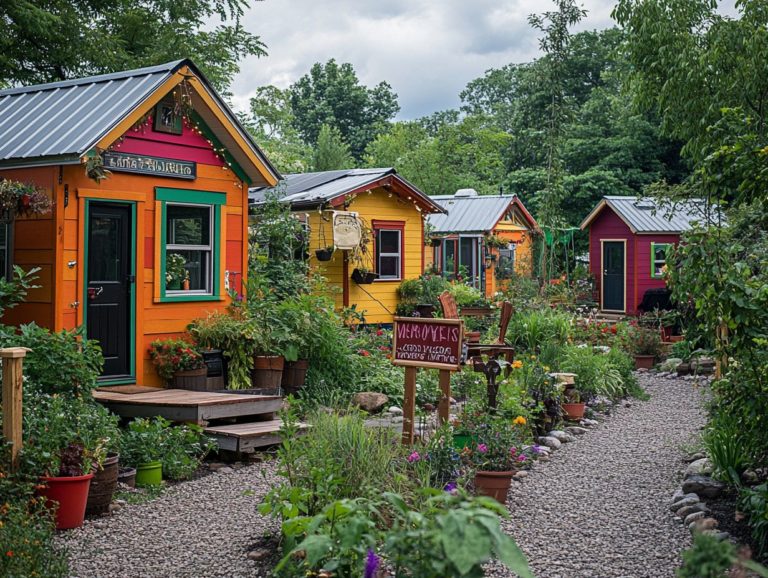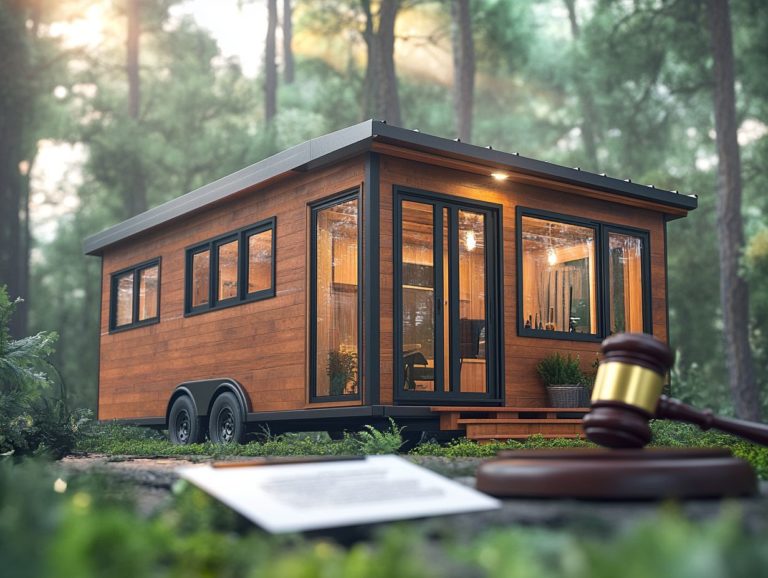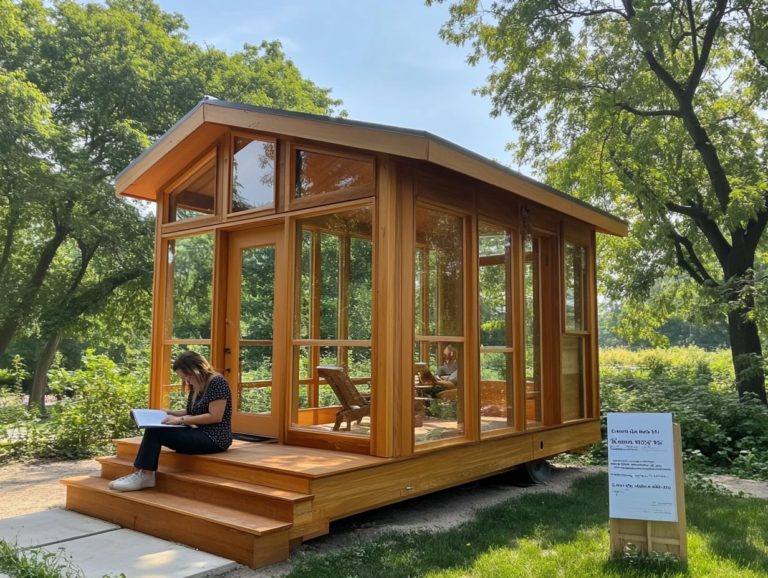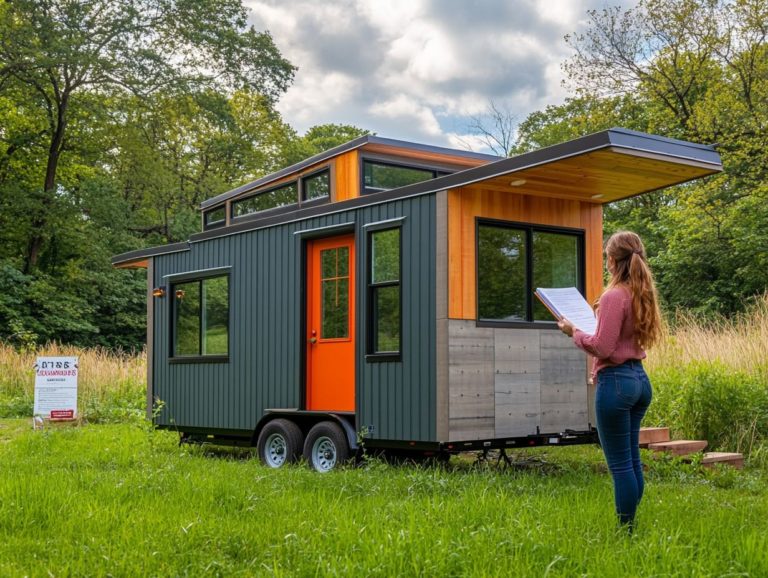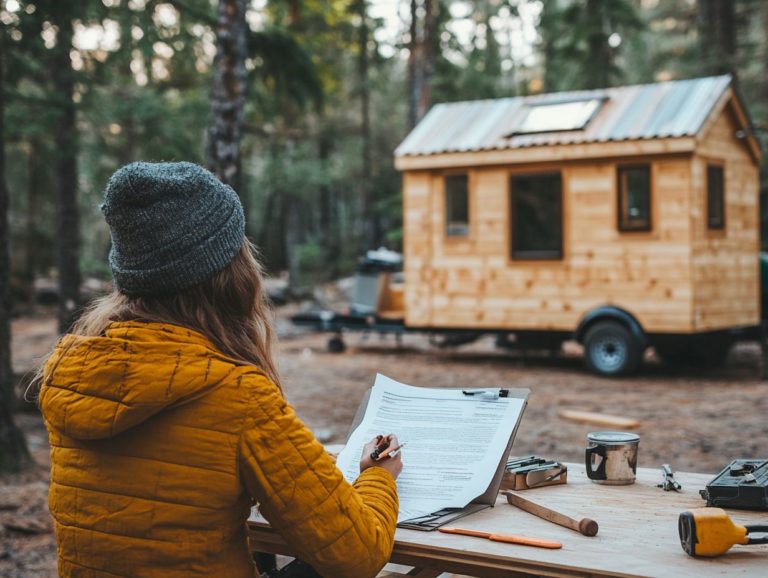Tiny House Financing: Legal Aspects to Consider
Tiny house living is gaining traction, promising a minimalist lifestyle paired with financial freedom that many aspire to achieve. This growing tiny house movement celebrates the advantages of downsizing and simplifying living situations.
However, financing a tiny home presents distinct challenges and considerations. As you explore various mortgage options, you will need to understand the complexities of traditional mortgages and alternative methods, as well as legal intricacies like zoning laws (local regulations governing land use) and building codes (standards for construction). This journey requires meticulous planning, especially when considering tiny house costs.
Get ready to explore the exciting world of tiny house financing! This guide will empower you to make informed decisions as you embark on your compact living dream.
Contents [hide]
- Key Takeaways:
- Understanding Tiny House Financing
- Legal Considerations for Tiny House Financing
- Financing Options for Tiny Houses
- Factors to Consider Before Choosing Financing
- Navigating Legal Challenges with Tiny House Financing
- Frequently Asked Questions
- What is the legal definition of a tiny house?
- Do I need a building permit to construct a tiny house?
- Can I finance a tiny house like a traditional home?
- Are there any legal restrictions on where I can park my tiny house?
- What legal considerations should I keep in mind if I plan to rent out my tiny house?
- What are the potential legal risks of building and living in a tiny house?
Key Takeaways:
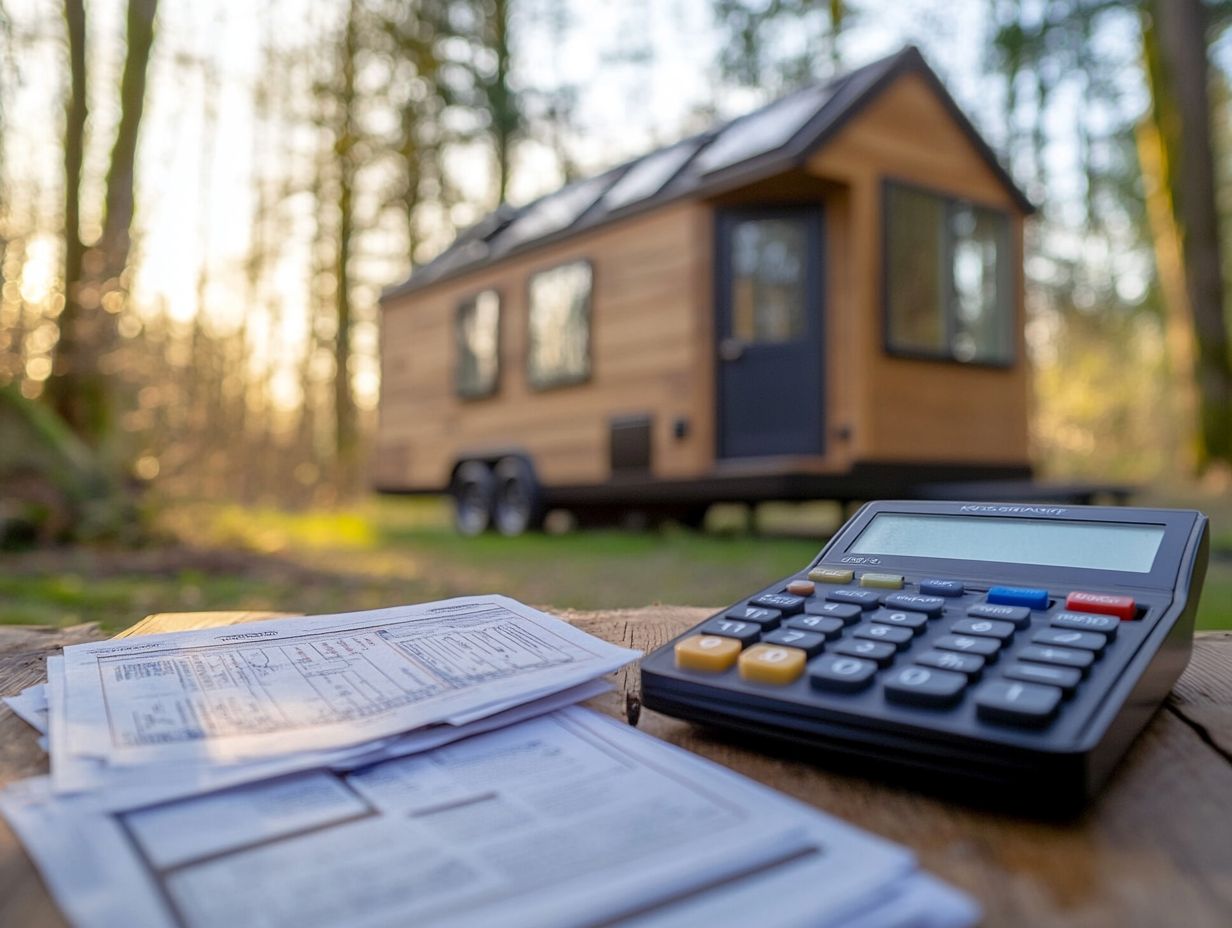
- Consider zoning and building codes before purchasing a tiny house to avoid legal challenges.
- Be aware of insurance and liability implications when financing a tiny house, as they may differ from traditional homes.
- Explore alternative financing methods, such as personal loans or RV loans, if traditional mortgage loans are not feasible.
Understanding Tiny House Financing
Understanding tiny house financing is crucial for anyone looking to embrace the burgeoning tiny house movement. As average home sizes continue to soar, the allure of tiny homes has never been greater, especially in states like California and Florida, where property taxes can be staggering.
You have a range of options at your disposal, including personal loans, RV loans, and home equity loans each designed to meet various needs and budgets. Familiarizing yourself with these choices is essential for making informed decisions that align with your financial goals.
What is Tiny House Financing?
Tiny house financing encompasses a range of financial options tailored for those eager to invest in tiny homes. These options present unique challenges that differ from traditional mortgage pathways.
These financing methods provide the flexibility you might need if you don’t have the full purchase price at your fingertips. Personal loans offer a straightforward solution, typically featuring modest interest rates that enable you to cover various costs associated with tiny living, such as land acquisition and essential utilities (heating, ventilation, and air conditioning – HVAC). Additionally, seeking tiny house legal assistance can help navigate any legal considerations that may arise during your journey.
RV loans specifically cater to mobile tiny homes, offering favorable terms based on vehicle classification. If you own property, home equity loans allow you to tap into your existing property’s value, providing substantial sums to alleviate financial pressures when building or purchasing these compact spaces.
By grasping the nuances between these options, you can navigate your aspirations with greater confidence and clarity.
Legal Considerations for Tiny House Financing
Navigating the legal considerations for tiny house financing is essential for you as a potential homeowner. It s vital to ensure compliance with local zoning laws and building codes, as well as obtaining necessary building permits, which can vary significantly from one jurisdiction to another.
Understanding these nuances will enable you to make informed decisions and avoid potential pitfalls in your journey toward tiny house ownership, especially if you’re working with tiny house contractors.
Zoning and Building Codes
Understanding zoning and building codes is crucial for anyone considering financing a tiny house. These regulations dictate where and how tiny homes can be constructed or placed.
As a tiny house enthusiast, you’ll need to navigate the intricate landscape of local and regional legislation. Zoning laws can vary dramatically from one location to another. In many areas, the International Residential Code serves as a guiding standard, influencing building permits by establishing essential safety and structural benchmarks. Additionally, understanding tiny house legal challenges is crucial for successfully overcoming obstacles in your journey.
Complying with these codes is vital, not just for securing necessary approvals but also for shaping your financing options. Most lenders tend to favor properties that adhere to stringent regulations.
Following local zoning requirements can significantly impact your property’s future value. Homes that comply with regulations are generally more appealing to buyers, ensuring you a better return on your investment.
Insurance and Liability
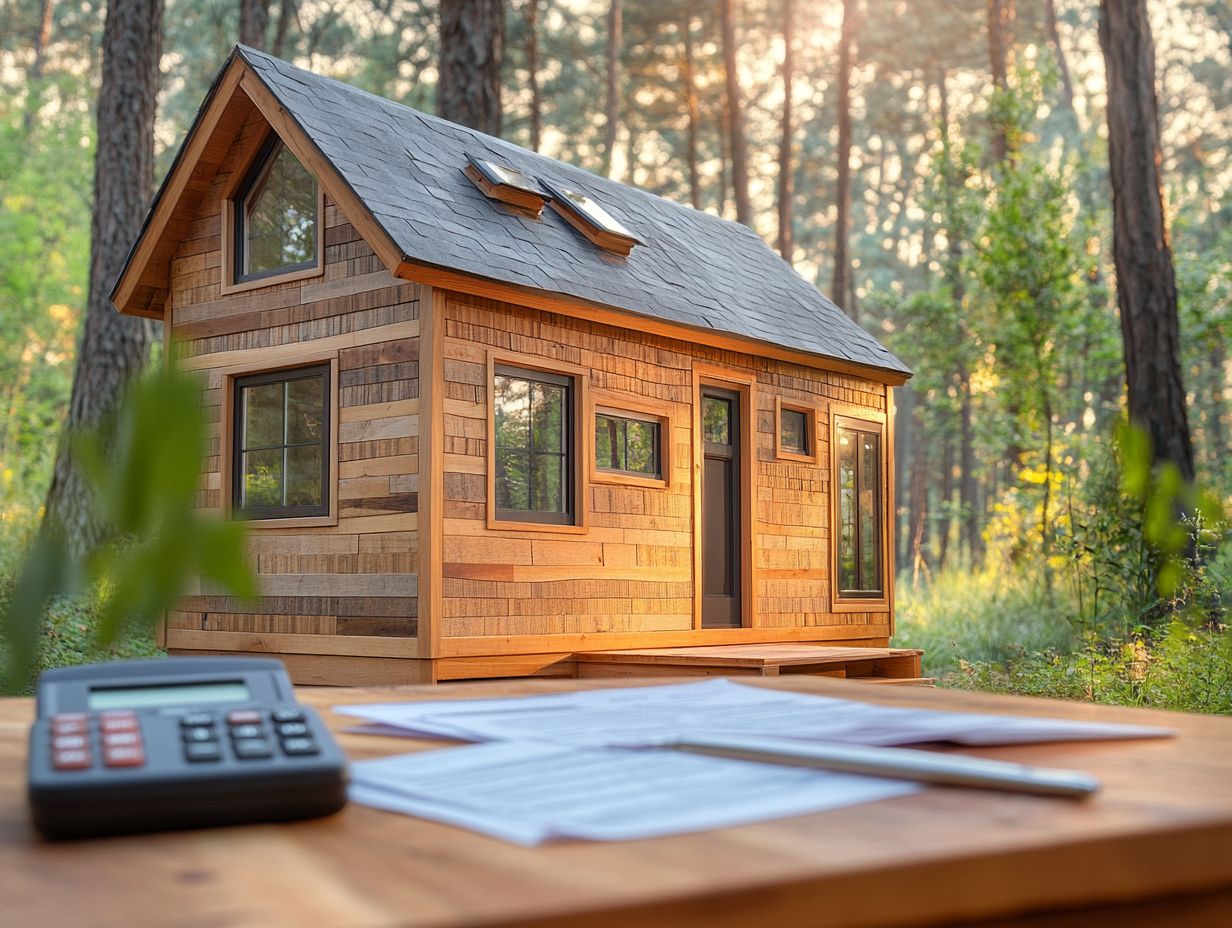
Insurance and liability are crucial elements in the realm of tiny house financing, particularly when considering property taxes and the unique requirements of tiny house financing. As a tiny homeowner, you must ensure your home is adequately protected against potential risks while complying with local building codes, especially if your home is either stationary or a tiny house on wheels.
This need arises from the unique nature of tiny living, where insurance requirements can differ significantly based on whether your home is stationary or mobile. Tiny homes on wheels often encounter distinct rules that insurance companies use to decide if they will cover your tiny house compared to those anchored to a permanent foundation, which may require more intricate policies.
Local building codes can impose specific insurance mandates, impacting everything from liability coverage to the choice of construction materials. Act now to understand these crucial factors that could protect your investment while fulfilling your legal obligations effectively, including understanding insurance requirements for tiny homes.
Financing Options for Tiny Houses
When considering financing options for tiny houses, you have a range of choices at your disposal. These include traditional mortgage options and specialized tiny house loans. While traditional mortgage loans are available, they tend to be less common given the distinctive nature of tiny homes.
Explore exciting alternative financing options tailored just for tiny house lovers like you, providing solutions to suit your unique needs.
Traditional Mortgage Loans
Securing traditional mortgage loans for tiny houses can present quite the challenge. This is primarily due to the smaller average home size and the unique structures that often fall outside conventional lending guidelines.
These lending practices arise from standard mortgage criteria that prioritize typical home dimensions and features. This makes it tough for lenders to accurately assess risk in the context of the average home size.
As the average home size rises, many traditional lenders lean towards properties that align with established square footage and design norms.
As a result, you may encounter obstacles like higher interest rates, stricter credit score requirements, and a limited array of financing options, especially if using credit cards or seeking RV loans. Understanding these distinctions is crucial for anyone considering this lifestyle, particularly with regard to tiny house living legal myths.
This might mean seeking alternative financing methods or working with specialized lenders who cater to the growing tiny house market, including companies like Tumbleweed Tiny House Company.
Alternative Financing Methods
Alternative financing methods for tiny houses, such as personal loans and RV loans, present flexible options if you cannot qualify for traditional mortgage loans.
These alternatives are appealing, offering shorter repayment terms and less stringent credit requirements. They are ideal for those drawn to a minimalist lifestyle, including building tiny house kits. Personal loans stand out as an excellent choice; they often don t require collateral and feature fixed monthly payments, allowing you to manage your budget with greater ease.
On the flip side, RV loans cater specifically to recreational vehicles, which can include tiny homes on wheels. While they might offer lower interest rates compared to personal loans, they often come with higher overall costs if your tiny house isn’t classified as a permanent structure. It’s essential to understand tiny house licensing to ensure you meet all requirements.
Specialized tiny house loans are available to address the unique financial scenarios you may encounter, providing terms that acknowledge the unconventional nature of these dwellings.
Factors to Consider Before Choosing Financing
Before choosing financing options for your tiny house, it’s essential to weigh factors such as your budget, affordability, and the location of your future home.
These elements play a crucial role in determining the overall affordability of your investment, particularly regarding tiny house costs and location-related factors, especially considering the tiny house movement and legal challenges.
Budget and Affordability
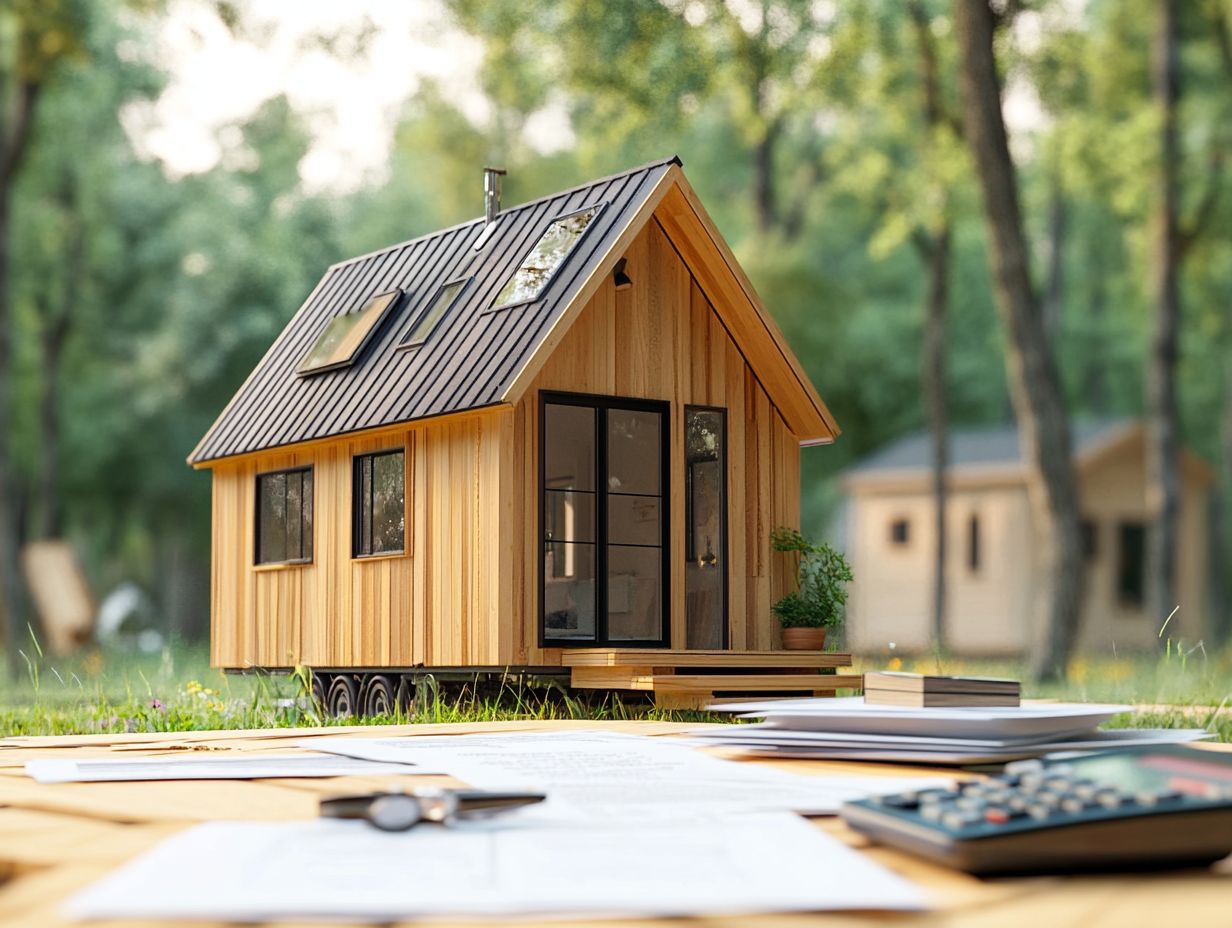
Determining a realistic budget and understanding what you can afford are crucial steps in financing your tiny house. Costs can vary greatly depending on location and design choices.
If you’re considering this lifestyle, conduct a thorough cost analysis, including land acquisition, construction materials, permits, and utilities like HVAC and plumbing. Don’t forget to factor in ongoing expenses like property taxes, insurance, and maintenance. Additionally, make sure to check the legal status of tiny houses in your area to ensure compliance.
Exploring various financing options whether personal loans, mortgages, or specialized tiny house loans will give you a clearer picture of what fits within your financial capabilities and aligns with your long-term goals. Additionally, it’s important to understand tiny house HOA rules to ensure that your chosen financing method aligns with your income and long-term goals. This will pave the way for a sustainable and stress-free tiny living experience, making it much easier for you to fully embrace this unique lifestyle.
Location and Property Ownership
When financing a tiny house, location and property ownership are key considerations. Different areas come with their own zoning laws, property taxes, and land availability, all of which can impact your financial options when considering tiny homes.
For instance, if you’re thinking about placing a tiny house on wheels, some regions are more welcoming to such structures, offering greater flexibility in financing. However, if you choose a permanent foundation, you may encounter stricter regulations. It’s important to be aware of tiny house laws that require a thorough understanding of local codes and possibly additional costs.
The intricacies of property ownership, whether you’re renting a plot or purchasing land, can significantly affect your loan terms and interest rates. Grasping these dynamics, along with understanding tiny house licensing, will enable you to make informed choices, ensuring that your financing decisions align seamlessly with the realities of your chosen location.
Navigating Legal Challenges with Tiny House Financing
Navigating the legal challenges of tiny house financing can feel overwhelming. As a prospective homeowner, you’ll likely face several common legal issues, including zoning regulations, building codes, and insurance requirements, all of which can differ significantly depending on your location.
Common Legal Issues and How to Address Them
Common legal issues in tiny house financing often center around zoning regulations and compliance with building codes. These issues can cause complications if not meticulously addressed during the planning phase.
Navigating these legal hurdles requires an active approach to fully grasp local regulations. Start by researching the zoning laws specific to your area, as these laws dictate where tiny homes can be placed, often limiting them to designated zones. For more comprehensive information, refer to tiny house legal resources you should know.
Securing the proper building permits is essential. Act now to avoid legal headaches later! Neglecting this step could result in fines or even legal action. Connecting with a knowledgeable local attorney or a tiny house advocate can offer valuable insights into best practices for adhering to these regulations.
Networking with other tiny homeowners helps you understand local challenges and find effective solutions.
Frequently Asked Questions
What is the legal definition of a tiny house?
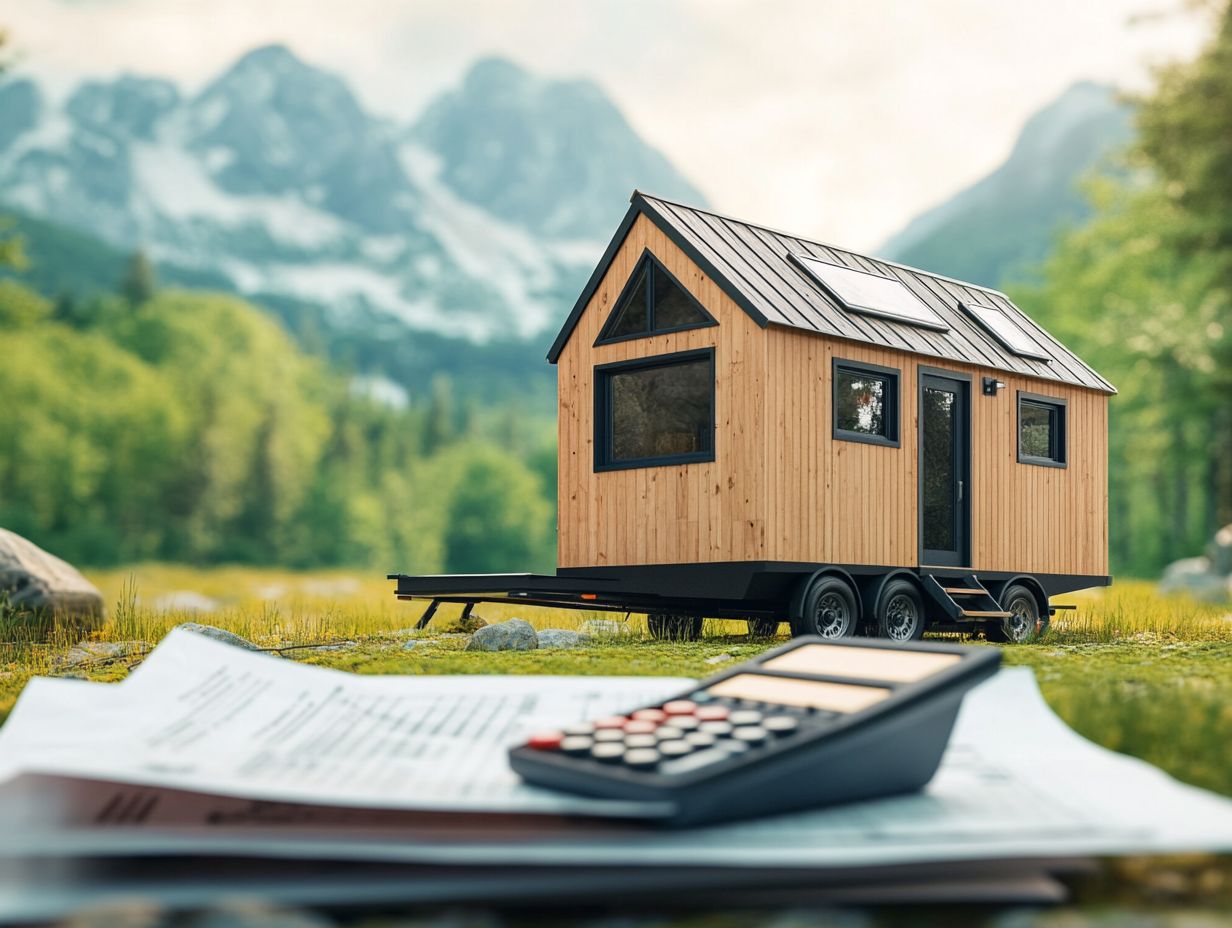
A tiny house is typically defined as a residential structure that is no larger than 400 square feet and is designed to be mobile or on a permanent foundation. However, the legal definition may vary depending on the state or municipality you live in.
Do I need a building permit to construct a tiny house?
Yes, most states and municipalities require building permits for any new construction, including tiny houses. Don t skip this step! Check with your local building department to make sure your tiny house meets all safety and zoning requirements.
Can I finance a tiny house like a traditional home?
Yes, there are various financing options available for tiny houses, including personal loans, RV loans, and even traditional mortgages. It s essential to do your research and carefully consider your budget and long-term financial goals before choosing a financing option.
Are there any legal restrictions on where I can park my tiny house?
Yes, there are often zoning and land use regulations that dictate where you can park your tiny house. Some municipalities may allow you to park in designated RV parks or campgrounds, while others may require you to have a permanent foundation and be connected to utilities in order to be considered a legal residence.
What legal considerations should I keep in mind if I plan to rent out my tiny house?
If you plan to rent out your tiny house, there are several legal aspects to consider. You may need to obtain a business license, pay taxes on rental income, and comply with landlord-tenant laws. Consult with a lawyer to ensure you are following all necessary legal guidelines.
What are the potential legal risks of building and living in a tiny house?
Some potential legal risks of tiny house living include zoning and building code violations, disputes with neighbors or landlords, and potential difficulties with obtaining insurance or financing. Thoroughly research and understand the legal implications of living in a tiny house before making the decision to do so.
Got more questions? Reach out to us for personalized advice on tiny house financing!

